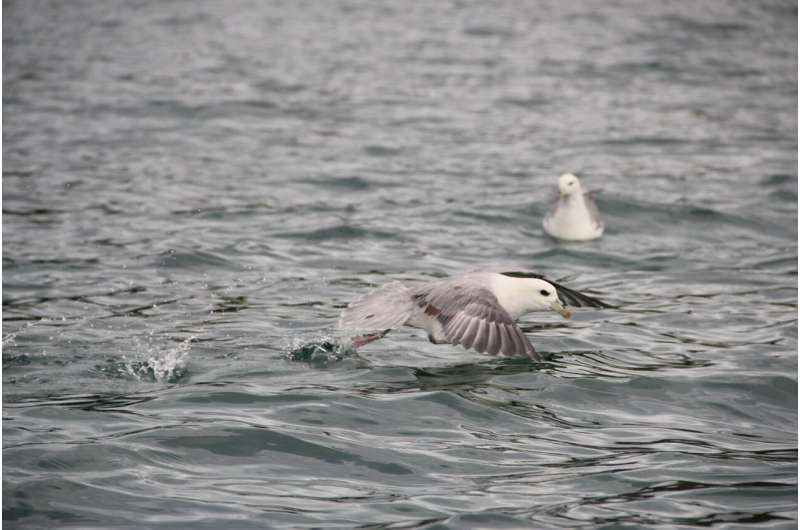Follow the boat, find the bird—free food from trawlers helps identify important areas for seabird conservation

Studying fishing boats’ routes could assist better coastal planning and ultimately protect threatened seabirds, according to new research from University College Cork (UCC).
An international team, led by the Marine Ecology Group at MaREI, the SFI Research Centre for Energy, Climate and Marine hosted by UCC, equipped seabirds with the latest tracking technology and found that fishing vessels can help figure out where the birds go to feed.
Northern fulmars, a relative of the albatross, were shown to travel hundreds of kilometres in a matter of days for a meal before returning home, and their tracks revealed that up to half of the fulmars were following fishing vessels for food in the form of fishing waste thrown overboard.
The researchers then looked at the wider distribution of fulmars around Irish and UK waters and found that areas of the sea that fishing vessels spent the most time in were also where fulmars went to feed. Northern fulmars are an endangered species in Europe with markedly declining populations. This new understanding of their feeding grounds is vitally important for protecting them from the hazards they may face at sea at a time when most of the world’s seabird populations are threatened. Fulmars are often accidentally caught by vessels. Because fulmars can live to 50 years old, even occasional bycatch in fishing gear can have big implications for their population. This study highlights the need for best practice when fishing, including bird scaring lines when setting nets or trailing longlines.
Lead author Jamie Darby of MaREI at UCC said:
“Information about where seabirds go at sea is vital for making sure that new offshore developments, including windfarms, can be designed to do the least amount of harm. That’s why studies such as this one are so important.
“Humans have given seabirds a lot to contend with. They are sensitive to oil and plastic pollution; we accidentally catch them in commercial fishing gears; we’ve brought rats and other invasive species onto many of their breeding colonies over the last few centuries.”
Ireland has a huge expanse of marine territory and attracts fishing vessels from overseas because these fishing grounds are so productive. Ireland’s commitment to renewable energy means that windfarms will soon be a common fixture along the coasts. However given the islands and cliffs of Ireland are home to 24 species of seabird, proper planning of these energy generators is essential if these birds are to be protected.
Millions of seabirds rely on discarded fish
JH Darby et al, Foraging distribution of breeding northern fulmars is predicted by commercial fisheries, Marine Ecology Progress Series (2021). DOI: 10.3354/meps13887
Citation:
Follow the boat, find the bird—free food from trawlers helps identify important areas for seabird conservation (2021, November 26)
retrieved 26 November 2021
from https://phys.org/news/2021-11-boat-birdfree-food-trawlers-important.html
This document is subject to copyright. Apart from any fair dealing for the purpose of private study or research, no
part may be reproduced without the written permission. The content is provided for information purposes only.
For all the latest Science News Click Here
For the latest news and updates, follow us on Google News.

